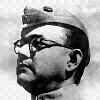

Subhas Chandra Bose Tags: Subhas Chandra Bose View |
Subhas Chandra Bose (Bengali (bn):????? ?????? ???) born 23 January 1897; presumed to have died (Death in absentia) 18 August 1945, although this is disputed (#Disappearance and alleged death)), popularly known as Netaji (literally "Respected Leader"), was one of the greatest leaders in the Indian independence movement.
Bose advocated complete freedom for India at the earliest, whereas the Congress Committee wanted it in phases, through a Dominion status. Other younger leaders including Jawaharlal Nehru supported Bose and finally at the historic Lahore Congress convention, the Congress had to adopt Purna Swaraj (complete freedom) as its motto. Bhagat Singhs martyrdom and the inability of the Congress leaders to save his life infuriated Bose and he started a movement opposing the Gandhi-Irwin Pact. He was imprisoned and expelled from India. But defying the ban, he came back to India and was imprisoned again.
Bose was elected president of the Indian National Congress for two consecutive terms, but had to resign from the post following ideological conflicts with Mahatma Gandhi and after openly attacking the Congress foreign and internal policies. Bose believed that Mahatma Gandhis tactics of non-violence would never be sufficient to secure Indias independence, and advocated violent resistance. He established a separate political party, the All India Forward Bloc and continued to call for the full and immediate independence of India from British rule. He was imprisoned by the British authorities eleven times. His famous motto was "Give me blood and I will give you freedom".
His stance did not change with the outbreak of the Second World War (World War II), which he saw as an opportunity to take advantage of British weakness. At the outset of the war, he left India, travelling to the Soviet Union, Germany and Japan, seeking an alliance with the aim of attacking the British in India. With Japanese assistance, he re-organised and later led the Azad Hind Fauj or Indian National Army, formed from Indian prisoners-of-war (Prisoner-of-war) and plantation workers from British Malaya, Singapore, and other parts of Southeast Asia, against British forces. With Japanese (Imperial Japan) monetary, political, diplomatic and military assistance, he formed the Azad Hind Government in exile, regrouped and led the Indian National Army in battle against the allies at Imphal (Battle of Imphal) and in Burma (Burma Campaign).
His political views and the alliances he made with Nazi (Nazi Germany) and other militarist regimes at war with Britain have been the cause of arguments among historians and politicians, with some accusing him of fascist sympathies, while others in India have been more sympathetic towards the inculcation of realpolitik as a manifesto that guided his social and political choices.
He is presumed to have died (Death mystery of Netaji Subhash Chandra Bose) on 18 August 1945 in a plane crash over Taiwan. However, contradictory evidence exists regarding his death in the accident.
Date of birth: 1897-01-23
Birth Location: Cuttack, India, Cuttack, Orissa, Bengal Presidency, British Raj, British India
Nationality: Indian
Allias Name: Netaji
Known For: Prominent Figure of Indian independence movement activism and reorganizing and leading the Indian National Army in World War II
Title: Head of the indian govt in exile, Image:AzadHindFlag.png Azad Hind, Ceremonial chief of Indian National Army
Party: Indian National Congress, Forward Bloc
Alma Mater: University of Calcutta, , University of Cambridge
Religion: Hinduism
Spouse: Emilie Schenkl
Children: Anita Bose Pfaff
Parents: Janakinath Bose , Prabhavati Devi

